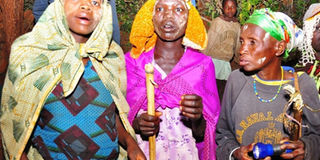Pokot girls desert their homes, fear undergoing circumcision

Girls smeared with ash await to undergo the circumcision ritual in Amudat District recently. PHOTO BY Stephen Ariong.
What you need to know:
Girls in Amudat District in north-eastern Uganda seek refuge from schools and authorities over forced circumcision.
Amudat
Sarah Cherot is playing a hide and seek game with a dozen other girls at Kalas Girls Primary School in Amudat District. The thrills and laughter that come from them echo through the empty classrooms as it is holiday time and the other students are at home.
Ms Cherot is one of 140 girls from the Pokot community in the district that have remained at school, refusing to go back to their homes for holidays fearing to be circumcised.
“Here, we are safe and do not have to worry about forced circumcision and marriage,” says 14-year-old Cherot, who is in primary five.
Cherot, together with a group of friends, escaped from their homes in Nabokotom Village in Amudat Sub-county in March this year when their parents were preparing them to face the surgeon’s knife.
“If you get a chance and watch the way a girl or a woman cries while going through the process, you will feel like to killing the surgeon that time,” she said.
The girls say they have lost many of their friends and relatives to the knife due to excess bleeding while others have remained disabled. Betty Chelangat, another girl, says she developed the idea of running away from her home to the RDC’s office in the district when she recalled the pain her friends were going through after being circumcised.
“We were 10 girls and both of us were supposed to face one knife but they sent us to collect water from the bore hole before we could be circumcised. But while at the borehole, we developed idea of running away from our homes to the RDC office,” she said, adding, “When we reached the RDC’s office and explained to him our situation, he warmly received us and brought us here (at school).”
The RDC, Mr Stephen Nsubuga Bewayo, has been instrumental in rescuing the girls and registering them in the boarding section of Kalas Girls School.
Mr Nsubuga, when contacted, said the children are under his care and appealed to development partners to help him take care of the children with other scholastic materials. Some of the girls now in primary seven say they will go back to their homes when they are in secondary school and when they are grown up.
Mr Peter Tukei, a teacher at Kalas Girls Primary School, said the girls did not go back to spend holidays with their parents. “The rest of children left to their homes for holidays but these particular ones, who run away from their homes and are brought here by the RDC, refused to go,” Mr Tukei said.
Female Genital Mutilation (FGM) is seasonally carried out, especially in Sebei, Pokot and Tepeth in Moroto District in north-eastern Uganda. It is carried out as a ritual to initiate young girls into womanhood. On July 20 last year, girls aged 8 to 14 years were forced by their parents to go through FGM in Amudat District.
In 2010, government passed the law against female circumcision after health experts found it was claiming many lives of expectant mothers and girls due to prolonged pregnancy. Civil Society Organisations and women activists in Uganda have over the years launched a spirited fight against the practice and a lot of resources have been used as incentives to make the local population shun the practice. The practice is mostly carried out by traditional doctors, who often play other central roles in communities, such as attending childbirths. It is condemned worldwide.




